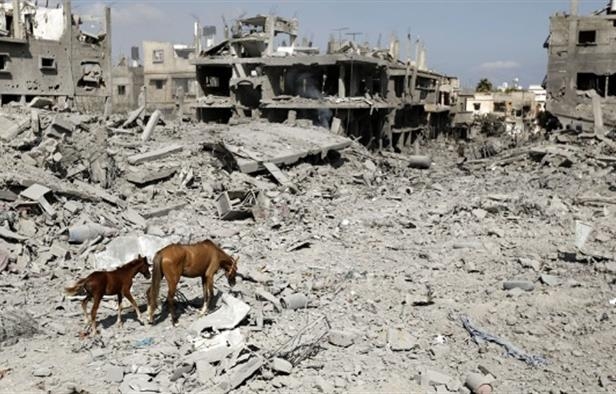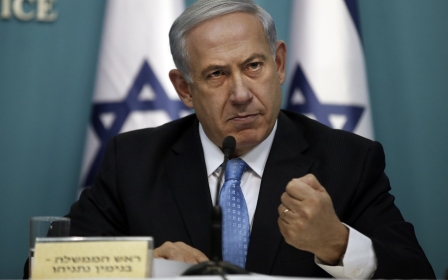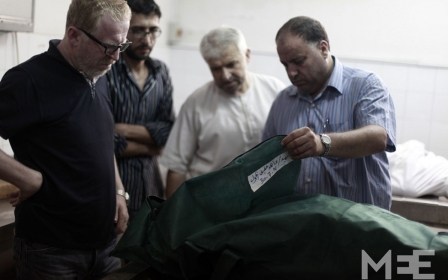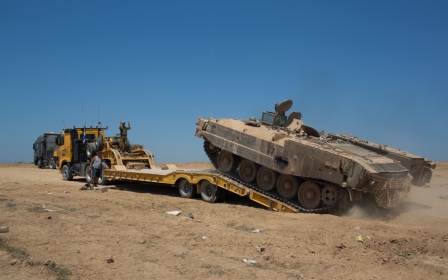Gaza demands implementation of ceasefire agreements as blockade chokes recovery

After two weeks with no water following Israel's 50-day offensive, Abu Osama took matters into his own hands, and like hundreds of others, sank a well beside his Gaza home.
After nearly two months of Israeli bombardment, power cuts and water shortages, he seized upon the ceasefire to get down to work.
"Water supplied by the municipality had not been arriving for more than two weeks and there were 50 of us in the house, including many children, so I decided to sink a well" to draw water directly, the 45-year old said.
Water shortages are nothing new for Palestinians in the densely populated Gaza Strip enclave, and more and more people have been digging their own wells since 2006.
Israel imposed a blockade on the territory that year after Gaza militants captured one of its soldiers.
Since then "more than 10,000 wells have been dug", said Monzer Shoblak, an official in Gaza's water authority.
"All these wells were dug without legal authorisation, but without them may people would not have water throughout the day," he said.
But this direct access to water comes at a cost, and Abu Osama, who did not give his full name, had to shell out 2,000 Jordanian Dinars ($2,820) to dig and maintain his well.
It is a price that many residents of Gaza, where unemployment has now hit 55 percent, are unable to afford.
Abu Mohammed, who also refused to give his last name, decided to dig a well on his land to ensure that his family had enough water to drink and for washing.
"The water was totally cut and the war complicated our situation further," he said.
Umm Mohammed, his wife, said it was "no longer like living in the 21st century".
"We get our water from the well, and we bake bread on an open fire," she said.
Water pipes hit
"I used to have flowers and a beautiful garden, but everything has been scorched by the sun," she said wistfully, gesturing at two parched palm trees withering in dry soil.
During the devastating Israeli bombardment, water pipes were also hit in the only power station serving the Gaza Strip, a sliver of land squeezed between Egypt, Israel and the Mediterranean where 1.8 million people live.
The fighting aggravated already chronic water shortages in the enclave, said Rebhi al-Sheikh, deputy head of the body in charge of the precious resource in Gaza.
"The only reserve available to us is the coastal aquifer we share with Egypt and Israel made up of 55 million cubic metres," he said.
But this is far from sufficient, because for "Gaza alone you need 190 million cubic metres every year".
And the United Nations has warned that Gaza's already short water supplies could be running out.
The aquifier could be unusable by 2016 and the damage it has suffered may be irreversible by 2020, experts believe.
Shoblak said that some 95 percent of Gaza's water is already contaminated.
"The volume of nitrate in the water should not go above 50 milligrams per litre. In Gaza the levels are about 200-250 milligrams," he said.
Chloride, which should be kept to 250 mg per litre, in some areas of Gaza reaches 2,000 mg, Shoblak said.
The authorities in Gaza have already launched several new projects aimed at providing water to those most in need, but these have been suspended at inception because the blockade prevents certain construction materials from entering the Strip.
During the ceasefire negotiations, Israel said it would allow the entry of some materials for reconstruction, without specifying what it would permit or when it would cross into Gaza.
But for the moment, no cement, gravel or steel has passed through the border crossings linking Gaza to Israel.
Gaza reconstruction bill at nearly $8bn
The reconstruction of the Gaza Strip, devastated during 50 days of war with Israel, will cost $7.7 billion, Palestinian experts said in a report published on Thursday.
The Palestinian Economic Council for Development and Reconstruction, a Palestinian Authority body that oversees the implementation of donor-financed projects, said the process would take "five years if Israel removed its blockade over Gaza entirely."
Since 2006 Gaza has been subject to a blockade that, among other things, prevents the entry of construction materials, which Israel fears could be used by militants to build tunnels and fortifications.
The coastal enclave, home to 1.8 m people and bordered by Israel and Egypt, was ravaged between July 8 and August 26 in its third war in six years.
As well as costing the lives of more than 2,150 Gazans, the conflict destroyed thousands of homes, severely damaged the enclave's sole power plant and razed dozens of factories.
But the 1.8 million-2.2 million tonnes of debris estimated to have resulted from the destruction of buildings could also be used to expand the territory into the sea, according to the report by 13 Palestinian experts.
A conference of international donors for the reconstruction of Gaza is set to take place later in the month in either Egypt or Norway.
‘Extreme shortage of basic medicines’
Around 27 percent of medicine in the Gaza Strip has run out while 48 percent of all medical disposables have been exhausted, a Palestinian Health Ministry official has said.
"Gaza hospitals are suffering an extreme shortage of basic medicines and medical disposables," Deputy Health Minister Youssef Abul-Riesh said.
He called on Israel to implement the terms of the ceasefire deal to allow the entry of badly-needed medical supplies into Gaza.
Speaking at a press conference, he added that Israel's recent onslaught on the Gaza Strip had worsened the already bad health conditions in the Palestinian territory.
He said Israel's recent offensive had left 2,152 Gazans dead, 44 percent of whom had been children, women and elderly people.
Abul-Riesh added that 11,231 other Palestinians had been injured, while Israel also had targeted 12 hospitals and 24 medical centres across the embattled coastal strip.
Gaza unemployment hits 55%
Economic losses from Israel's onslaught on the Gaza Strip have upped the unemployment level 55 percent, Gaza's workers’ union said on Thursday.
During the offensive, 30,000 Gazans lost their jobs at over 500 shops, factories and company offices destroyed by relentless Israeli bombardments, according to a statement issued by the workers’ union.
The workers union said the war had exacerbated Gaza's unemployment crisis, which stems originally from the blockade that has left 170,000 people out of work.
"These 200,000 unemployed Gazans support some 900,000 people [in Gaza]," the union asserted.
The offensive, launched with the stated aim of ending rocket fire from Gaza, finally ended with the announcement on August 26 of an open-ended cease-fire between Israel and Palestinian resistance factions.
According to Israeli figures, 67 Israeli soldiers and five civilians were killed over the course of the operation – the highest military death toll suffered by Israel since it lost 119 troops in its 2006 war on Lebanon.
New MEE newsletter: Jerusalem Dispatch
Sign up to get the latest insights and analysis on Israel-Palestine, alongside Turkey Unpacked and other MEE newsletters
Middle East Eye delivers independent and unrivalled coverage and analysis of the Middle East, North Africa and beyond. To learn more about republishing this content and the associated fees, please fill out this form. More about MEE can be found here.




